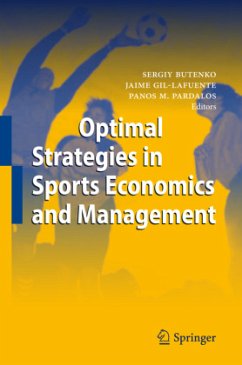This book examines developments in several topics, including resource allocation strategies in sports industry, impact of the financial crisis on professional sports around the world, fairness in sports competitions and optimization-based gambling strategies.
During the last century, we have witnessed the birth and evolution of sport as an economic activity, which has created jobs on the one hand, but also problems of management on the other. This process has not been immune from the parti- lar characteristics associated with sport, typically united here more than in other activities: technique, physical effort, entertainment and passion. And all this within a framework of ever-increasing consumption of ?nancial resources. It is not s- prising, therefore, that commonly-used economic models, based on mechanistic approaches, do not provide a viable solution to increasingly complex and incre- ingly frequent problems. Any attempt to apply such an approach in this technical, economic and ?nancial context can only result in failure. The high degree of subj- tivity inherent in sporting activity requires new tools, in which remodeled conc- tual, theoretical and technical elements should play an important role. Complexity, uncertainty and subjectivity are therefore basic to understand, and deal with, the phenomenon of sport. The necessity of resorting to these elements was identi?ed over a quarter of a century ago by a small group of professors and researchers at the University of Barcelona. Together we started the ?rst postgraduate courses and organized se- nars to alert sports centre managers, as well as to make private and public organi- tions aware of the increasing importance of a proper, speci?c management for sports organizations.
During the last century, we have witnessed the birth and evolution of sport as an economic activity, which has created jobs on the one hand, but also problems of management on the other. This process has not been immune from the parti- lar characteristics associated with sport, typically united here more than in other activities: technique, physical effort, entertainment and passion. And all this within a framework of ever-increasing consumption of ?nancial resources. It is not s- prising, therefore, that commonly-used economic models, based on mechanistic approaches, do not provide a viable solution to increasingly complex and incre- ingly frequent problems. Any attempt to apply such an approach in this technical, economic and ?nancial context can only result in failure. The high degree of subj- tivity inherent in sporting activity requires new tools, in which remodeled conc- tual, theoretical and technical elements should play an important role. Complexity, uncertainty and subjectivity are therefore basic to understand, and deal with, the phenomenon of sport. The necessity of resorting to these elements was identi?ed over a quarter of a century ago by a small group of professors and researchers at the University of Barcelona. Together we started the ?rst postgraduate courses and organized se- nars to alert sports centre managers, as well as to make private and public organi- tions aware of the increasing importance of a proper, speci?c management for sports organizations.








